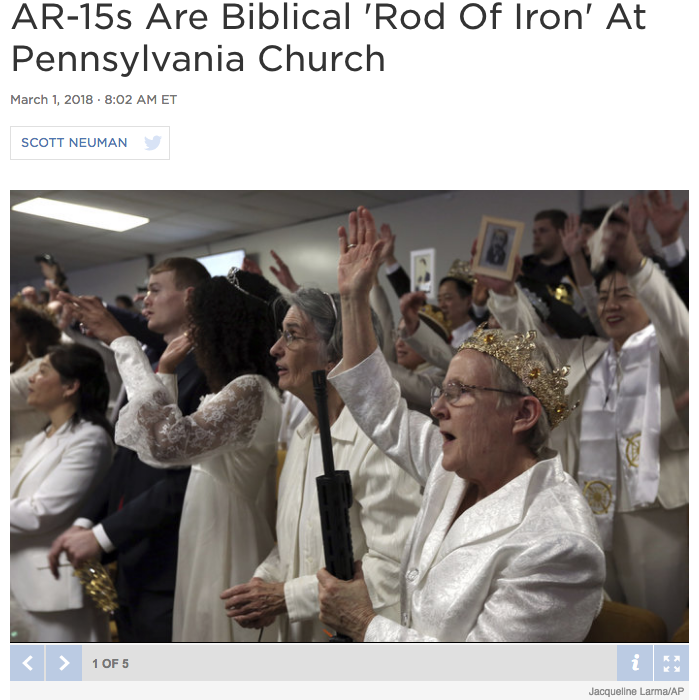Words matter. Which words we use to describe a person or a group can have a significant impact on the image that our description and analysis constructs. In the aftermath of the Parkland School shooting a few weeks ago, a Pennsylvania ceremony that involved the blessing of AR-15s drew considerable response in the traditional media (as in the screenshot above) and across social media. It is easy to see the ways that the narrative about the ceremony became a pawn within the renewed gun control debate, illustrating how narratives are more about the interests of narrators than the specifics of the event. But more than that point (which my colleagues have made before in posts on topics such as sex workers or charges of Satanism) is the significance of the names that different commentators used for this group and ceremony.
Headlines on both CBS News and NPR, among others, described the event as occurring in a Pennsylvania church. Whatever the intent of the respective editors, some on social media used the ritual as evidence of a problematic commitment to guns among (presumably) conservative American Christians. Newsweek used an alternative name in the headline, identifying the ceremony as a ritual within a cult (though the web address retained the church label). The reference to a cult generates a different response, with fears of fringe groups with what people assume are radical, irrational commitments.
Which classification is more accurate is not my primary concern, as various groups use the different labels to promote their own policy and social interest. The bigger question is how do commentators decide when to accept a group’s or individual’s self-identification and when to replace those self-identifications with an alternative. The organization that conducted this blessing of AR-15s identifies as both the World Peace and Unification Sanctuary and the shortened Sanctuary Church. The organization, an offshoot of the Unification Church that is sometimes labeled the “Moonies,” follows the leadership of Rev. Hyung Jin Moon, and his wife Rev. Yeon Ah Lee Moon, who, according to the group’s website, are “carrying on the providential work of his father, the Rev. Sun Myung Moon, whose encounter with Jesus at age 15 led to his six decade worldwide ministry to fulfill Christ’s mission, based on his Biblically based teachings, the Divine Principle.” While they do not specifically use the term “Christian” for themselves, the organization uses the terms church, ministry, Bible, and Christ’s mission, much as other groups who identify as Christian do. Thus, based on self-identification, the name church is accurate.
As much as the organization probably wants to be seen as a legitimate part of global churches, others choose to ignore that name, replacing it with the term cult as a means to marginalize the group and its teachings that diverge from those of many groups that identify as Christian. Other groups, such as the Southern Poverty Law Center, use the label cult when describing certain ideas of the Sanctuary Church that these groups oppose, such as what the SPLC names as its racism, anti-Semitism, and anti-LGBT positions.
Seeing how various groups use different terms for the organization as much (if not more) to further their own preferences and ideas as to present an accurate description, anyone discussing the organization, whether scholars or journalists or random people on Facebook, choose what name to use, and in that choice, whether intentionally or not, promote one of a variety of political positions. It is not sufficient to repeat the name that a group uses for itself, as others who use that same label will probably contest that name. Ignoring the group’s self-identification for the preferences of their opponents is no better. Unless we choose to enter into the debate over what constitutes acceptable Christianity, the best alternatives are to either avoid the debate with a neutral label (organization, ceremony, etc.) or highlight whose labeling is being repeated (e.g., a group that identifies as a church, a cult according to its detractors). Such precision is also important for mainstream groups, rather than only contextualizing the names of marginal groups, thus reinforcing without analysis the dichotomy between mainstream and marginal. Because the name (and its associated connotations) make a significant difference, such precise acknowledgement of whose label we use is important.
For more on this approach to describing groups, see the Afterword “Accidental Favorites” in Culture on the Edge’s edited collection Claiming Identity in the Study of Religion.
Image credit: Screenshot from NPR.org (https://www.npr.org/sections/thetwo-way/2018/03/01/589808670/ar-15s-are-biblical-rod-of-iron-at-pennsylvania-church)


Ironically enough I just read Smith’s version of “Cults” and, in my opinion, thats exactly what this is. These people use Christianity and have turned their church into a subset of it. They still are a protestant but focus more on gun control specifically rather than everything else. Their claim of the “rod of iron” being referenced to an AR-15 in a biblical sense is also cult like in the aspect of the Bible most definitely does not claim a gun to be held to such prestige. In religion, geography is very important when it comes to naming and identifying. When it comes to this church, it is easy to identify the region where this is located because gun control and even more specifically, AR-15s is one of the most hot topic issues in the United States today. Meaning, you wouldn’t see this type of cult in a country like Australia for example because this isn’t a social issue to them. Thats my take on this article.